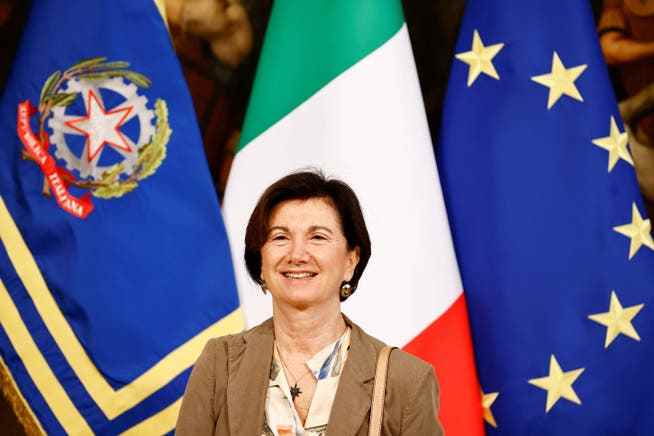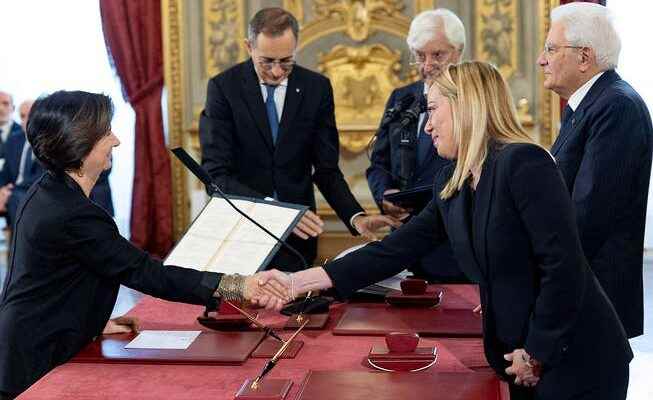The arch-Catholic Eugenia Roccella, as Minister for Family Affairs and Birth, is the most controversial figure in the new government in Rome.
Eugenia Roccella shakes hands with Prime Minister Giorgia Meloni after the swearing-in ceremony on October 22.
When the Italian head of government made her inaugural visit to Brussels last week, her office in Rome reported: “President Giorgia Meloni has in Brussels the President of the European Parliament Roberta Metsola, the President of the EU Commission Ursula von der Leyen and the President of the Council of Europe Charles met Michael.” The curious usage of the article reignited the debate over the new prime minister’s grammatical gender.
Giorgia Meloni wants to be called “Mr. President”.
The controversy was triggered by Melonis’ office manager, Carlo Deodato. In a circular, the lawyer informed the Italian power apparatus at the beginning of the government about the correct way to address his boss: It should be called “il Signor Presidente Giorgia Meloni”, informed Deodato (Prime Ministers are called “Presidente del Consiglio dei ministri” in Italy).
Mr. President or the president – Meloni herself downplayed the question in parliament after her government statement, stating: “I never believed that women’s freedom consisted in being able to call themselves a train driver.” Apparently, the masculine form of address suggests a prestige that the feminine lacks. This is typical of the Italian right. Female official titles are considered derogatory in their ranks.
Now there are more pressing problems in Italy at the moment. And actually, the highest linguistic institution in the country, the Accademia della Crusca, founded in 1583, has already clarified the matter of the gender of job titles. In 2008 she found that it was enough to use the gender-specific article and adapt the corresponding adjective in order to be linguistically up to date with social change.
The Italian women are not only concerned with linguistics, but also with the question of what rights and what role the first woman at the head of government would like to assign them in society. Eugenia Roccella could provide an answer to this. She has been Minister for Family, Births and Equal Rights for two weeks. Roccella herself would like to be addressed as “la ministra”. But she finds it ridiculous that Meloni is attacked in the question. “Giorgia Meloni has revolutionized the macho pattern in Italian politics,” said the politician in an interview with the liberal newspaper Il Foglio. For the first time, a woman in power does not conform to the image formed by men.

Eugenia Roccella before her first cabinet meeting at Palazzo Chigi.
The state should implement the commandments of God
Critics, on the other hand, see the post-fascist head of government as a traitor to feminism. Roccella, the frontwoman of the planned reactionary turn in social politics, is also accused of the same thing. The appointment of the 68-year-old arch-Catholic politician from Bologna was the most controversial of the nominations for the 24-strong cabinet. Roccella has been a member of Melonis Fratelli d’Italia since 2022, before that she belonged to various other right-wing parties.
Even the renaming of her department makes her program clear. The Department for Equality and Family renamed the new right-wing governing coalition the Department for Family, Births and Equality. The goal of equal opportunities was not only demoted in the title of the department. With Roccella, a representative of the so-called theoconservatism, a political ideology of the right-wing spectrum, which stands for a greater role of religious belief in daily politics and focuses on the preservation of traditional values, comes at the helm. The followers of this form of socio-political conservatism demand that God’s commandments from the Bible should play a greater role in public life and should be implemented by the state.
For years Roccella has been fighting against registered partnerships for same-sex couples and their right to adoption, but also against surrogacy, living wills, euthanasia and abortion. However, the committed Catholic has never campaigned for equality for women. It is therefore a red rag for civil rights activists, LGBT and feminists.
Roccella herself has stated that she wants to focus on the women’s issue. For her, this primarily means upgrading motherhood. The Family and Birth Minister wants to help overcome the “demographic ice age” announced by Meloni in her government statement.
The population decline continued in Italy in 2021. The population has dropped to less than 59 million. The birth rate fell to 1.24 children per woman of childbearing age, the lowest level since the unification and founding of the Kingdom of Italy in 1861. The European average is 1.6.
declining birth rate
In the medium term, the demographic crisis is undoubtedly one of Italy’s greatest challenges. Nowhere in Europe does the low birth rate endanger economic growth and pension provision for future generations as much as in heavily indebted Italy.
The birth rate urgently needs to be increased. But while everyone agrees on the goal, the approach divides the country. Meloni, who went into the election campaign with the triad “God, fatherland and family”, wants to remedy the causes of the birth crisis with an arch-conservative social policy. The family – by which she understands only heterosexual couples with children together – deserves more protection and support from the state as a cornerstone of society, Meloni demands. In their election manifesto, the Fratelli d’Italia promised higher child benefits and more tax breaks for families.
In fact, the main reason for the low birth rate in Italy is the financial insecurity of the 20-40 generation. Young couples often simply cannot afford to think about starting a family. However, international experience shows that the demographic curve only reverses when employment opportunities for women improve. And Italy brings up the rear in Europe with an employment rate of 49 percent for women. That is why those responsible in the Ministry of Labor should be particularly concerned about the subject of births.
